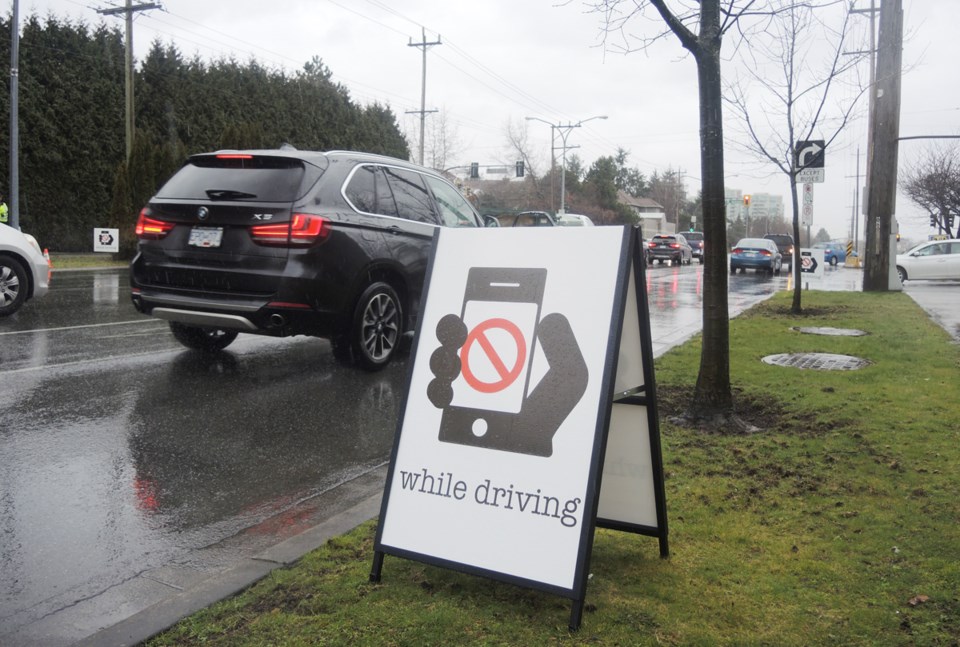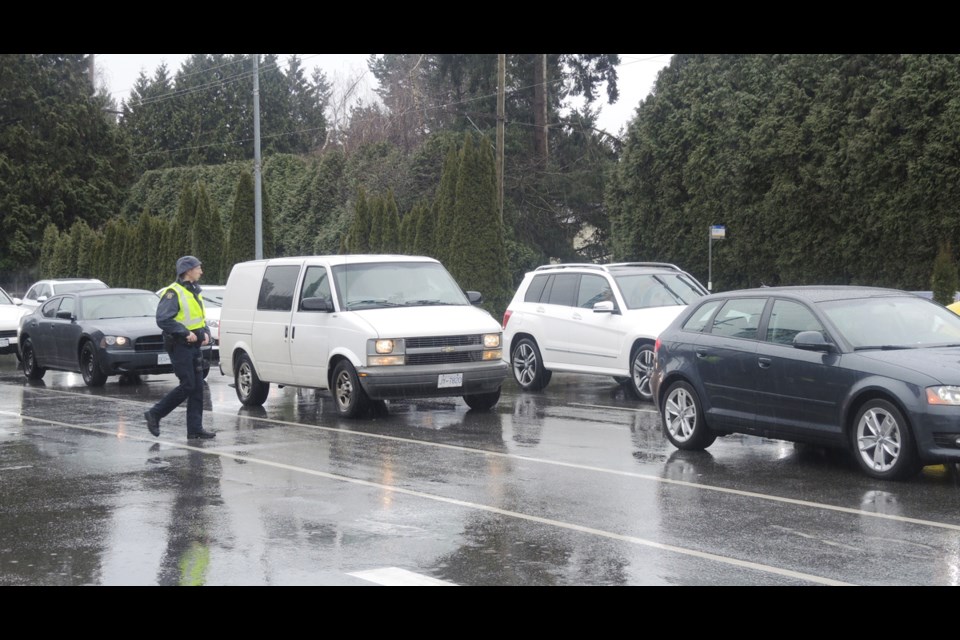It wasn’t quite shooting fish in a barrel, but the targets weren’t that difficult to catch at a hotspot in Richmond.
As part of a B.C.-wide distracted driving blitz, Richmond Mounties and their volunteer officers were out on force in the pouring rain Thursday morning at the busy Garden City Road and Westminster Highway intersection.
In their sights were the drivers who still seem to think it’s OK to use their phones while behind the wheel of a vehicle in operation, a dangerous practise which, on average, claims the lives of 78 people in B.C. every year.
A handful of undercover spotters placed strategically further down the road radioed ahead to colleagues hiding behind trees and lampposts when they clocked an offender.
And even in the 20 minutes or so the Richmond News observed the team in action, several drivers were promptly escorted into the nearby Esso gas station to receive their $368 ticket and four penalty points.
“We’re checking to see if they have a phone in their lap, if they’re texting, are they reading their texts or are they talking to someone? Sgt. Nigel Pronger, of Richmond RCMP’s Road Safety Unit, told the News.
Asked what signs of cell phone activity his officers are looking for, Pronger said, “It’s like poker; it’s ‘the tell,’ everyone has one and drivers using their phones have it.
“It’s people looking down mostly. If their eyes aren’t looking out through the window, if they’re looking down at their lap, there’s a good chance they’ve got their phone out.
“And you can stand and watch through their window and see where their hands are.
“But we’re not just checking here, or just this month; we’re going to be checking everywhere, 24/7.”

Pronger said the worst cases of distracted driving he has seen involved people drinking coffee with one hand and using the phone in the other, all while driving with their knees.
“It also bothers me when I see large vehicles, such as trucks. The drivers are on their phones, their vehicles take up a lot of space. They’ve got potential to do some real damage,” he added.
And the excuses?
“Everything you can possibly imagine; ‘it’s an important phone call, I was just moving (the phone),” said Pronger.
“There are blatant liars, claiming they didn’t even have their phones out, when I could tell them exactly what model of phone they have.
“But when we stop someone and engage in conversation, most people admit what they were doing and don’t lie to us.”
Although Pronger feels the attitude towards distracted driving is getting a little better, he said it will likely continue to plague our roads for the foreseeable future.
“The laws came in recently to address the issue and I would like to think we’re at a little bit of a plateau and things will start to get better,” he said.
“Technology is changing and many new cars have Bluetooth built-in, which is great. And I think there’s a greater awareness now, especially with the likes of these campaigns, and ICBC has put a lot into it.
“But the stats are still not good; distracted driving does cause accidents and does cause death.”
Of special concern to Pronger in Richmond is vulnerable pedestrians being in the firing line from drivers using their phones.
“With urban driving mixed with distracted driving, you’re much more likely to hit someone here in the city,” he explained.
“Even at low speed, you can hurt someone quite badly, we see it all the time in parking lots. People seem to think that, as soon as they slide into the parking lot, they’re OK to pull their phones out.
“There are pedestrians, seniors, children and we will be targeting those areas as well. You’ve got to be in ‘park’ before you pull out that phone.
“Cars have hi-tech with airbags everywhere and anti-collision built-in, but people haven’t changed, they don’t have airbags.”
One hope of agencies such as police and ICBC is that distracted driving becomes as socially unacceptable as drunk driving has become.
“It’s a gradual awareness. People need to understand that they’re putting themselves, other drivers and the whole community at risk,” said Pronger.
“Just as impaired driving has changed, we will see the same thing happening here. I think a lot of it can be addressed through technology.”
The B.C. government announced this week tougher penalties for distracted drivers would take effect this month, alongside the piloting of new technologies.
Starting March 1, 2018, ICBC's Driver Risk Premium (DRP) program will include convictions for distracted drivers who continue to put road users at risk by using electronic devices while driving.
Drivers with two convictions for the use of electronic devices, while driving over a three year period, will now face added and higher premiums.
They could pay as much as $2,000 in penalties – an increase of $740 over the previous penalties – in addition to their regular vehicle insurance premium.
And starting this month, police will also begin to test new distracted driving scopes with further abilities to capture dangerous driving behaviours. Police will be testing the units for usability and effectiveness in all weather and traffic conditions.
Meanwhile, the B.C. government is also taking action at certain intersections that have a high number of speed-related crashes.
They are upgrading the existing red-light camera program to identify and ticket the fastest vehicles.
Working to reduce crashes at these intersections, say the government, will also have a positive impact on ICBC's claims costs, and will help keep rates affordable.
In the coming months, analysis of crash and speed data will inform decisions about activating cameras for speed enforcement.
New signs will warn approaching drivers about this enhanced intersection enforcement.



